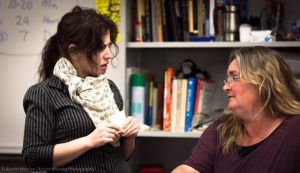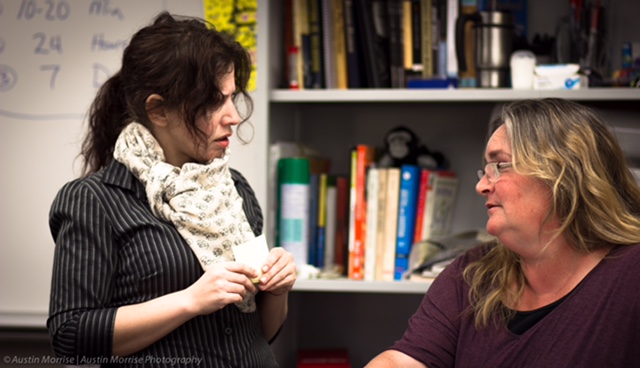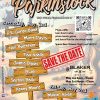The Woman Behind the Lower Level Studio
By Summer Krafft

When most people walk in downtown Modesto, they pass by City Center on the corner of 11th and J without realizing that just below ground there is a thriving and lively theater community. There is a heartbeat hiding below street level. At the head of that community is Traci Sprague, Artistic Director of Center Stage Conservatory’s Lower Level Studio. “It’s really hard to get the word out because there’s no visual of the theater at street level,” she stated in my interview with her. Traci also directs and acts for other theaters in the area.
As Artistic Director, on any given show, she is most likely directing her cast, designing the set with patience, care, and attention to detail, building the set herself, designing dynamic lights, designing sound that are magically always perfect for the energy of the show, engineering sounds on a computer program, mentoring a stage manager in the intricacies of running the show, running the house and welcoming patrons, and overseeing marketing to make sure the seats get filled. “I make sure anything that goes on there happens. You, know, entertainment, or a place that they can come and do stuff. And I say ‘stuff’ because I feel like we’ve gotten more broad over the years…it’s become more explorative.”
Over the past seven years with Traci acting as Artistic Director, Center Stage has become a home and safe haven for artists of all genres. In addition to working with traditional theatrical artists like actors, directors, designers, and stage managers, Traci has welcomed playwrights, poets, musicians, dancers, choreographers, photographers, and visual artists to contribute their talents and work to the space. She is outstanding as an artist in her own right, but even more exceptional in her ability to create opportunity for other artists where others may not see one. “Theater is a collaborative art. Just in the fact that you’re acting off of someone else makes it a collaborative process. You can’t control what the other person does onstage, you can only control how you react to it. Even a one-person show is still going to be collaborative because you still have someone shining the light on them. I love that it’s collaborative.” It has been one of my greatest honors in the local art scene to collaborate with her, and since our first project together, Scotland Road in Fall of 2014, she has welcomed me back time and time again with her signature warmth, openness, and generosity.
Traci first got involved with Center Stage through word of mouth about her work. “Center Stage Conservatory had gone through a couple years in a kind of hiatus and the board was feeling like it was time to donate what little money they had left over and call it quits. Maureen Whitacre (who is a Center Stage board member) talked to Grace Lieberman, who was part of the Stanislaus Arts Council when it was still in existence, and she told her to find some new blood to give it some new life. She talked to Colton Dennis, who I had worked with closely, and he recommended that she talk to me. I contacted Megan James because I felt like we were a good balance, so I asked if she would be down to help me on some projects. Megan and I came to the board with some of our ideas and they were like ‘Awesome, run with it.’ Our first project was Center Stage Youth Summer Conservatory in 2010. The guy who ran Modesto Virtual let us rehearse there that summer, and made a deal with CSU Stanislaus to use their mainstage. And then we just kept going!” Center Stage procured its current space in the lower level of City Center just over four years ago, but has been hosting artists and putting on shows since their first year.
This past year, I was lucky enough to work with Traci as the head-writer and as an actor on a devised theater project which she had been planning since her work with Center Stage began. “Whenever you’re doing something new, it becomes this magical thing. Like Collecting the Echoes was on that list from the first board meeting, and seeing the combination of poetry and dance, and ultimately music, come together in this magical thing that we’ll never really re-create.”
Collecting the Echoes was a collaborative play that included traditional theatrical scene, spoken word monologue, and modern dance set to contemporary music performed by one of Center Stage’s largest casts, all of whom happened to be artists in their twenties. One of the most special things about Center Stage is the room Traci makes for young artists in the work. And beyond that, truly what makes Center Stage so unique in that its leader is endlessly trusting of her artists, and therefore creates truly collaborative work that honors everyone involved. This is how such special, and compelling work is born.
In addition to running Center Stage, Traci also acts and directs for other semi-local theaters. “I’ve cut back quite a bit. I used to always do two to three projects simultaneously for Murphy’s, Sonora, Merced, Modesto, but I realized at the start of this calendar year that I had been doing too much. One project at a time is really what I want right now. Most of the work I do is with Merced Shakespearefest, and I recently did ‘The Orchard’ at Prospect.” Along with running Center Stage’s youth program, Traci is a mother of four. Her babies-who-are-not-really-babies-anymore are Forrest (18), River (17), Juniper (16), and Lorelei (14), all of whom also happen to perform in the arts. Their talents vary from acting to music to dance to poetry, and reflect their mother’s passion, dedication, innovation, and talent.
When I asked her about her favorite projects she’s worked on locally, Traci said, “Certain projects are in your favorites because they provided something for you. Probably my all-time favorite was Julius Ceasar out in Merced. It was an all-female cast set in a high-security men’s prison. It was such a magical experience seeing these women transform. It was still community theater. With such different levels of talent, of experience, it was fairly diverse in age, and there were some characters that just shined because of their ensemble work…you know, what they brought to create their world…and then there were other actors that were so good with the text that they brought the character to life in a new and interesting way.”
The first show I saw at Center Stage was True West, which stunned me in its intensity, and Traci counts among her favorite projects. “True West’s actors came at such a high level that it forced my directing style to adjust to them and forced me to step up to their level and change some of my directing methods to fit them.” The outcome of that collaboration was a gritty, thrilling ride that left the audience breathless and shaken.
It is important to note, however, Traci’s individual talent as an actor, in addition to consistently stunning her casts and audiences as a director. Of her other favorite projects, she said, “As an actor, A Streetcar Named Desire out in Sonora at Stage 3. Getting the opportunity to play Blanche was such a huge challenge, such a huge opportunity. It’s such a treat when you have to rebuild yourself. That role required me to go to my neutral and rebuild myself completely. And I was fortunate enough to work with a really good director and a bunch of great actors. Different things mean different things to me.” Her ability to strip her usual behaviors, gestures, and speech patterns to match her fellow actors is radical and beautifully jarring. She is present in all of her characters, but she doesn’t allow herself to be comfortable in any of her characters by playing them as herself. Watching her work in any of these roles is a gift and one of the most valuable learning tools I’ve yet to find in my work in theater.
Traci plans to keep creating: thoughtfully, with intent, and pushing herself and her artists into the realm of what makes them usefully uncomfortable, all for the sake of growth for the audience and the performers. As far as what’s next, in addition to a full season of little-known but well-respected plays, she says, “I would love to do a collaborative projects every single year, or every other year. Like a devised project, where we see a need in our community, and figure out what the story is we want to tell for our community. Just being in a community like Modesto, or the valley in general, there’s such a need for art, and being healed through arts, that it seems weird not to do something that’s important to us, here. I’m all about devised projects. It takes a ton of people putting in a lot of work, and its emotional work. What we do is out of love for our community and for each other.”









